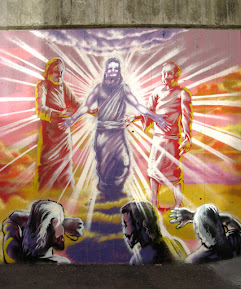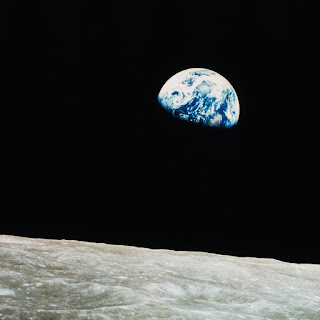'But it might be a good idea to send Putin to space. Cool him off a little bit. Give him some time, like six months, to experience what’s been called the Overview Effect.'
In the name of the Father, and of the Son, and of the Holy Spirit.
Do you know where I’d like to send Vladimir
Putin?
No, not to hell. That would sound pretty
bad after I just preached a sermon about loving enemies and being merciful.
Besides, there’s only One who can save or damn, and that One is far more
merciful and just than I am.
But I would like to send Vladimir Putin
somewhere – I’d like to send him to space.
Specifically, to the International Space
Station. He’d be right at home there. Some of the residents speak Russian. And
he’d learn how to work with the fascist godless Westerners who are there as
well.
Besides, this would get him farther away
from us. It’s like that prayer from Fiddler On The Roof, when Tevye
says: ‘God keep the Czar – far away from us!’
But it might be a good idea to send Putin to
space. Cool him off a little bit. Give him some time, like six months, to experience
what’s been called the Overview Effect.
In 1987, a man named Frank White was on a
panel discussion about spaceflight after the Challenger disaster. The
panel was asked, ‘Why should we spend the money and take the risk to send human
beings to space at all, when we can just send machines up there? White
responded that at least one of the reasons to send human beings to space is so
that humanity can have the experience of seeing the earth from space – a perspective
that changes a person.
In the weeks and months after that, White began
to interview some astronauts about their experience in space, and they
confirmed his intuitions. This is from an interview he gave in 2019:
Earthrise (from Apollo 8), William Anders
‘(T)he first thing that most people think about
when they think about the overview effect is no borders or boundaries on the
Earth. And we know that. But we create maps that show borders and boundaries.
And what the astronauts were telling me was, I, I knew before I went into
orbit, or went to the moon, that there weren't any little dotted lines. But
it's knowing intellectually versus experiencing it. And so, there's also the,
the striking thinness of the atmosphere, something that they see. And again,
for most astronauts, the feeling that the Earth itself is a whole system, and
we're just a part of it. We need to think of ourselves as part of this organic
system, if you will. And then there are other things that come out of it that
is kind of conclusion they draw. I mean, those are things they see, and then
there are conclusions they draw. And one of them is that we are really all in
this together. Our fate is bound up with people that we may think are really
different from them. We may have different religions, we may have different
politics. But ultimately, we are connected. Totally connected. And not only
with people, but with life. We're totally connected with life. And everything
relates to everything else. And out of that, also, is the realization again.
You could know that, too. I mean, you could say, I know that. I know we're all
connected. I know our differences don't matter that much. But again, it's
knowing it with the brain and not the heart. And so, the big, sort of, what
would I call it, insight, about their experience is that it is an experience.’
I’m pretty sure that Vladimir Putin has
never had an experience anything close to this. I don’t know if he thinks there
are actual dotted lines on the Earth or not. I know the imaginary lines he thinks
about are not the ones I think about, or the Ukrainian people think about. But
it might just be good for him to go and see that there are no lines. To enlarge
his moral imagination. For his moral imagination is narrow. And it’s costing
Ukrainians – and Russians – their lives. And please God, let there be someone
close to him with a larger moral imagination, let there be someone who might
convince him, or restrain him, or otherwise influence him. Because the range of
options for the future of the world is getting narrower and narrower.
Before human beings went to space or could fly in airplanes, they would ascend a mountain to gain perspective, to experience the overview effect, to catch a glimpse of transcendence, something beyond the everyday life on the ground. In today’s Gospel, Peter and James and John go up the mountain with Jesus. But it is not the view of earth from above that transforms them, but it is Jesus himself. In the transfigured Jesus, they get a vision of the glory of God and the dignity of the human being. The Son of God became a human being to reveal both God’s glory and human worth in God’s eyes.
 |
| Transfiguration, Anonymous |
Each human being bears the image of God.
This is the word of Genesis, and it is revealed in visible form when Jesus is
transfigured. For it is from a human body that God’s glory is revealed, not
only to say that this human body is shot through with God’s glory, but that
through Christ, each human body is and can be a temple of God’s glory, and is
therefore inviolable, given divine dignity and worth.
As images of God, as people who bear the
dignity of humanity, each person is inviolable. Would that Vladimir Putin would
have this perspective, but since, barring a miracle, for which we should all
pray, he will not gain that perspective, so we must pray that we would be given
that perspective. That we would believe in this man, this Jesus, we encounter
the transcendent which hallows the immanent, makes holy the things of this
earth.
We may not think we get the overview effect
when we come here on Sunday morning. It may not be that exciting. But we have
the Word, transmitted down through the generations to this very time and place.
‘This is my Son, the beloved: listen to
him!’ When we are given this perspective, the world changes. The little dotted
lines disappear – in our minds they become far less important. The person
across the street, across the world, across the political line, becomes not a
monster, but a fellow creature, inviolable, because God’s image is stamped upon
him or upon her.
And when we receive God in Christ’s body
and blood, and we hear the words, ‘For you,’ and we believe them, then it is
the difference between believing that Christ is the Savior of the world and
experiencing that he is our Savior. Of saying, Christ gave his life for the
world, but experiencing that Christ gave his life for me. That is the
difference between knowing a fact and experiencing a reality.
So we pray, this day, that someone might
gain some perspective. But we pray that all who are oppressed, all who need
perspective, all who need comfort, would find it in Christ, of whom the Father
says, ‘Listen to him!’ Who urges us to love our enemies and pray for those who
persecute us. Who tells us ‘be merciful as your Father is merciful.’ Who
through his apostle says, ‘Do not return evil for evil, but overcome evil with
good.’ Who gives us the peace that passes all understanding to keep our hearts
and minds in him.
Most likely none of us will go to space,
and for most of us, our mountain-climbing days are over. But we hear this word
and receive this sign, and we experience transcendence, the transcendence that comes
to us and hallows us, and we see it perhaps in those who also bear the image of
God.
In the name of the Father, and of the Son,
and of the Holy Spirit.
MCF +
